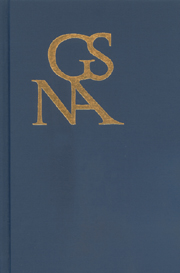Book contents
- Frontmatter
- Contents
- Special Section on Goethe and Idealism
- Introduction—Goethe and Idealism: Points of Intersection
- Goethe and Spinoza: A Reconsideration
- Goethean Intuitions
- Goethe's Notion of an Intuitive Power of Judgment
- “Idealism is nothing but genuine empiricism”: Novalis, Goethe, and the Ideal of Romantic Science
- The Quest for the Seeds of Eternal Growth: Goethe and Humboldt's Presentation of Nature
- Hegel's Faust
- Goethe contra Hegel: The Question of the End of Art
- Goethean Morphology, Hegelian Science: Affinities and Transformations
- Die Gretchenfrage: Goethe and Philosophies of Religion around 1800
- Civic Attachments & Sibling Attractions: The Shadows of Fraternity
- Margarete-Ariadne: Faust's Labyrinth
- Save the Prinz: Schiller's Geisterseher and the Lure of Entertainment
- Walsers Trilogie der Leidenschaft: Eine Analyse seines Goethe-Romans Ein liebender Mann im Kontext der Tradition der Ulrike-Romane
- Review Essay: What's New in the New Economic Criticism
- Book Reviews
Goethean Intuitions
from Special Section on Goethe and Idealism
Published online by Cambridge University Press: 05 February 2013
- Frontmatter
- Contents
- Special Section on Goethe and Idealism
- Introduction—Goethe and Idealism: Points of Intersection
- Goethe and Spinoza: A Reconsideration
- Goethean Intuitions
- Goethe's Notion of an Intuitive Power of Judgment
- “Idealism is nothing but genuine empiricism”: Novalis, Goethe, and the Ideal of Romantic Science
- The Quest for the Seeds of Eternal Growth: Goethe and Humboldt's Presentation of Nature
- Hegel's Faust
- Goethe contra Hegel: The Question of the End of Art
- Goethean Morphology, Hegelian Science: Affinities and Transformations
- Die Gretchenfrage: Goethe and Philosophies of Religion around 1800
- Civic Attachments & Sibling Attractions: The Shadows of Fraternity
- Margarete-Ariadne: Faust's Labyrinth
- Save the Prinz: Schiller's Geisterseher and the Lure of Entertainment
- Walsers Trilogie der Leidenschaft: Eine Analyse seines Goethe-Romans Ein liebender Mann im Kontext der Tradition der Ulrike-Romane
- Review Essay: What's New in the New Economic Criticism
- Book Reviews
Summary
MY ESSAY PROPOSES TO MAKE a modest down payment on a much-needed narrative of Goethe's philosophical development that refutes some widely held views. The first kind of account claims that Goethe was philosophically naive, unschooled, and uninterested. A second characterization I would want to counter, which might be called the “condescending neo-Kantian” narrative, is one in which Goethe began as a naive realist, was taken in hand by Schiller, and finally converted grudgingly to a kind of poorly understood Kantianism. Both these accounts are very far from the truth.
Goethe's philosophy and relationship to other philosophers can be characterized generally as “intuitive”—in all the senses of that (intentionally) ambiguous term. As a thinker, Goethe was inspired rather than methodical. Moreover, he was “intuitive” in his ability to size up philosophical issues and individual philosophers quickly, getting to the heart of the matter on surprisingly short acquaintance. And Goethe's philosophical work is focused specifically on the role of the faculty of intuition (Spinoza's scientia intuitiva; Kant's “produktive Einbildungskraft” and “intellectus archetypus”; Fichte's “intellektuelle Anschauung”) in epistemology, ethics, and scientific discovery.
As a philosopher of science, Goethe progresses through three phases, which one might call Realist, Idealist, and Romantic. The major influence in the first phase is Spinoza as interpreted by Herder; in the second, Fichte. In the third phase, Goethe develops an original epistemology that might be termed a kind of gesteigerter Spinozismus.
- Type
- Chapter
- Information
- Goethe Yearbook 18 , pp. 35 - 50Publisher: Boydell & BrewerPrint publication year: 2011

